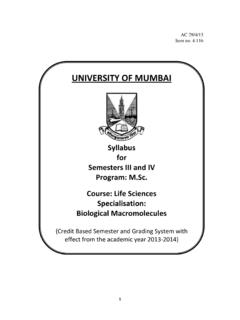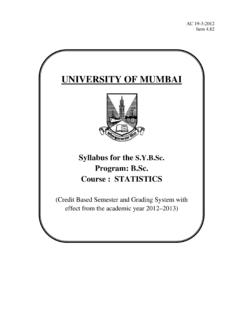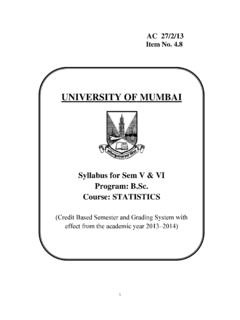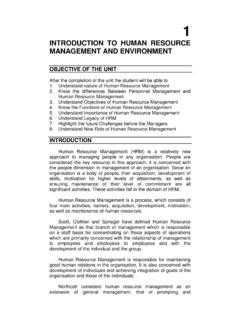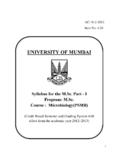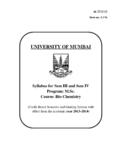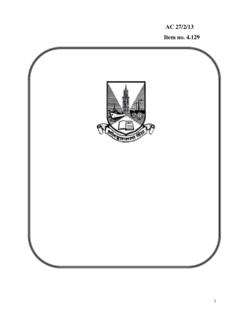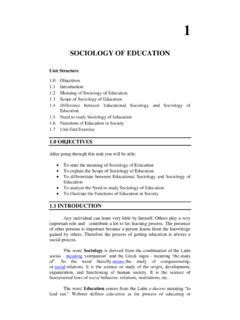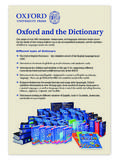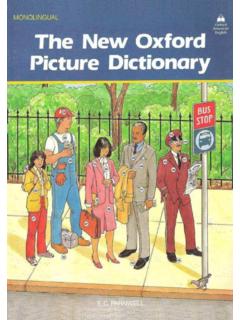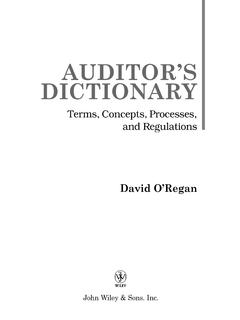Transcription of UNIVERSITY OF MUMBAI
1 AC- 19-3-2012 Item No. OF MUMBAIR evised Syllabus for the : : EnglishSemester I & IV (As per Credit Based Semester and Grading System with effect from the academic year 2012 2013 for Semester I & II and from the academic year 2013-14 for Semester III & IV) 1 UNIVERSITY of MUMBAI Syllabus for english Programme: Part I Course : Literary Theory and Criticism (Credit Based Semester and Grading System with effect from the academic year, 2012-13) 2 1. Syllabus as per Credit Based Semester and Grading System: i) Name of the Programme : ii) Course Code : PAENG101 & PAENG 201 iii) Course Title Part I : Literary Theory and Criticism Papers I & II iv) Semester wise Course Contents : Enclosed the copy of syllabus v) References and Additional References: Enclosed in the Syllabus vi) Credit Structure : No.
2 Of Credits per Semester 06 vii) No. of lectures per Unit : 15 viii) No. of lectures per week : 04 2. Scheme of Examination : 4 Questions of 15 marks each 3. Special notes , if any : No 4. Eligibility , if any : No 5. Fee Structure : As per UNIVERSITY Structure 6. Special Ordinances / Resolutions if any : No 3 MA english (Regular) Part One Title of the Course: Literary Theory and Criticism (Paper One: Aristotle to Formalism and Paper Two: Structuralism onwards) (to be implemented from 2012-2013 onwards) Objectives of the Course 1) To introduce the learners to a wide range of critical methods and literary theories 2) To enable them to use the various critical approaches and advanced literary theories 3) To enhance their analytical skills 4) To enable them to mobilize various theoretical parameters in the analysis of literary and cultural texts 5) To familiarize the learners with the trends and cross-disciplinary nature of literary theories 6) To introduce them to the conventions of research papers Semester One: Literary Theory and Criticism Paper I.
3 Aristotle to Formalism Course code- PAENG101 6 Credits Lectures: 60 Unit 1: Classical/Neoclassical Theories: 1. Aristotle Poetics 2. Samuel Johnson Preface to Shakespeare ( from english Critical Texts) (08 Lectures) Unit 2: Romantic Theories: 1. Samuel Taylor Coleridge Biographia Literaria (Chapter XVII and Chapter XVIII) 2. Percy Bysshe Shelley A Defence of Poetry (07 Lectures) (Both are from english Critical Texts) Unit 3: Indian Aesthetics/Literary Theories 1. S. N. Dasgupta The Theory of Rasa 4 2. S. K. De Kuntaka s Theory of Poetry: Vakrokti (08 lectures) (Both the essays are from An Introduction to Indian Poetics) Unit 4: Formalism and New Criticism 1. Cleanth Brooks Language of Paradox (07 Lectures) 2. Victor Shklovsky Art as Technique A) Internal Assessment 40% 40 Marks Particulars Marks 1 One assignment/project based on curriculum to be assessed by the teacher concerned 20 Marks 2 One classroom presentation on the project 10 Marks 3 A viva voce based on the project 10 Marks Students of Distance Education to submit one additional assignment in place of presentation and viva voce Following methods can be used for the tests and assignment (40 Marks) Analytical session (content analysis of literary theories to be decided by the Department center where the course is offered) Class presentation: on theories and approaches Writing position papers Book review of theories and criticism Article review.
4 Selected from journals and books Seminar participation Writing research papers Interpretation of literary and cultural texts(films, drama and Television shows) on the basis of given critical approaches or theories 5 B) Semester End Examination Pattern 60 Marks Question 1: Essay on the theories from unit 1: (1 out of 2) : 15 Marks Question 2: Essay on the theories from unit 2 (1 out of 2) : 15 Marks Question 3: Essay on the theories from unit 3 (1 out of 2) : 15 Marks Question 4: Essay on the theories from unit 4 (1 out of 2) : 15 Marks Semester Two: Literary Theory and Criticism (Paper Two: Structuralism onwards) Course code- PAENG201 6 Credits Lectures: 60 Unit 1: Structuralism, Poststructuralism and Deconstruction: 16 lectures 1. Roland Barthes The Death of the Author 2.
5 Jean Baudrillard Simulacra and Simulations (Both the essays are from Modern Criticism and Theory: A Reader) Unit 2: Marxism, Feminism and Ideology 14 Lectures 1. Fredric Jameson The Politics of Theory: Ideological Positions in the Postmodernism Debate 2. Gayatri Spivak Feminism and Critical Theory (Both the essays are from Modern Criticism and Theory: A Reader) Unit 3: Reader Response and New Historicism 16 Lectures 1. Wolfgang Iser Reading Process: A Phenomenological Approach (From Modern Criticism and Theory: A Reader ) 2. Stephen Greenblatt Resonance and Wonder (From Learning to Curse) Unit4: Postcolonialism, Diaspora and Ecocriticism 07 Lectures 6 1. Stuart Hall Cultural Identity and Diaspora (From Theorizing Diaspora) 2. Cheryll Glotfelty Literary Studies in an age of Environmental Crisis ( From The Ecocriticism Reader) A) Internal Assessment 40% 40 Marks Particulars Marks 1 One assignment/project based on curriculum to be assessed by the teacher concerned 20 Marks 2 One classroom presentation on the project 10 Marks 3 A viva voce based on the project 10 Marks Students of Distance Education to submit one additional assignment in place of presentation and viva voce Following Methods can be used for tests and assignment (40 marks) Analytical session (content analysis of literary theories to be decided by the Department center where the course is offered) Class presentation: on theories and approaches Writing position papers Book review of theories and criticism Article review: selected from journals and books Seminar participation Writing research papers Project.
6 Interpretation of literary and cultural texts(films, drama and Television shows) on the basis of given critical approaches or theories B) Semester End Examination Pattern 60 Marks 7 Question 1: Essay on the theories from unit 1: (1 out of 2,) : 15 Marks Question 2: Essay on the theories from unit 2 (1 out of 2) : 15 Marks Question 3: Essay on the theories from unit 3 (1 out of 2) : 15 Marks Question 4: Essay on the theories from unit 4 (1 out of 2) : 15 Marks Sources of the prescribed texts Braziel, Jana Evans and Anita Mannur (Ed.) Theorizing Diaspora. London: Blackwell, 2003. Enright, and Chickera, Ernst de. (Ed.) english Critical Texts. Delhi: Oxford UNIVERSITY Press, 1962. Glotfelty, Cheryll and Harold Fromm (Ed.) The Ecocriticism Reader: Landmarks in Literary Ecology. Athens: The UNIVERSITY of Georgia Press, 1996. Lodge, David and Nigel Wood (Ed.) Modern Criticism and Theory: A Reader (Second edition).
7 New Delhi: Pearson, 1988. Raghavan V. and Nagendra (Ed.) An Introduction to Indian Poetics. Madras: MacMillan, 1970. References Adams, Hazard. Critical Theory Since Plato. New York, Harcourt Brace Jovanovich, 1971. Abrams, M. H. A Glossary of Literary Terms. (8th Edition) New Delhi: Akash Press, 2007. Baldick, Chris. The Oxford Dictionary of Literary Terms. Oxford: Oxford UNIVERSITY Press, 2001. Barry, Peter. Beginning Theory: An Introduction to Literary and Cultural Theory. New Delhi: Viva Books, 2008. Drabble, Margaret and Stringer, Jenny. The Concise Oxford Companion to english Literature. Oxford: Oxford UNIVERSITY Press, 2007. 8 Fowler, Roger. Ed. A Dictionary of Modern Critical Terms. Rev. ed. London: Routledge & Kegan Paul, 1987. Habib, M. A. R. A History of Literary Criticism: From Plato to the Present. London: Blackwell, 2005. Harmon, William; Holman, C. Hugh. A Handbook to Literature.
8 7th ed. Upper Saddle River, : Prentice-Hall, 1996. Hall, Donald E. Literary and Cultural Theory: From Basic Principles to Advanced Application. Boston: Houghton, 2001. Hudson, William Henry. An Introduction to the Study of Literature. New Delhi: Atlantic, 2007. Jefferson, Anne. and D. Robey, eds. Modern Literary Theory: A Comparative Introduction. London: Batsford, 1986. Keesey, Donald. Contexts for Criticism. 4th Ed. Boston: McGraw Hill, 2003. Latimer, Dan. Contemporary Critical Theory. San Diego: Harcourt, 1989. Lentriccia, Frank. After the New Criticism. Chicago: Chicago UP, 1980. Lodge, David (Ed.) Twentieth Century Literary Criticism. London: Longman, 1972. Murfin, Ross and Ray, Supryia M. The Bedford Glossary of Critical and Literary Terms. Boston: 's, 2003. Nagarajan M. S. english Literary Criticism and Theory: An Introductory History. Hyderabad: Orient Black Swan, 2006.
9 Natoli, Joseph, ed. Tracing Literary Theory. Chicago: U of Illinois P, 1987. Ramamurthi, Lalitha. An Introduction to Literary Theory. Chennai: UNIVERSITY of Madras, 2006. Selden, Raman and Peter Widdowson. A Reader's Guide to Contemporary Literary Theory. 3rd Ed. Lexington: U of Kentucky P, 1993. Tyson, Lois. Critical Theory Today: A User-Friendly Guide. New York: Garland Publishing, 1999. Wolfreys, Julian. ed. Introducing Literary Theories: A Guide and Glossary . Edinburgh: Edinburgh UNIVERSITY Press, 2003. 9 Syllabus Prepared by: Dr. Dinesh Kumar (Convener) Vaze College, Mulund. Members: 1) Dr. R. M. Badode, Professor, Dept. of english , UNIVERSITY of MUMBAI . 2) Dr. Shekh, Shivaji UNIVERSITY , Kolhapur. 3) Dr. Shobha Ghosh, Dept. of english , UNIVERSITY of MUMBAI . 1 UNIVERSITY of MUMBAI Syllabus for english Programme: Part I Course: Linguistic and Stylistic Analysis of Texts Paper III & IV (Credit Based Semester and Grading System with effect from the academic year 2012-13) 2 1.
10 Syllabus as per Credit Based Semester and Grading System: i) Name of the Programme : ii) Course Code : UAENG102& UAENG 202 iii) Course Title : M. A Part I: Linguistic and Stylistic Analysis of Text Papers III & IV iv) Semester wise Course Contents : Enclosed the copy of syllabus v) References and Additional References: Enclosed in the Syllabus vi) Credit Structure : No. of Credits per Semester 06 vii) No. of lectures per Unit : 15 viii) No. of lectures per week : 15 2. Scheme of Examination : 4 Questions of 15 marks each 3. Special notes , if any : No 4. Eligibility , if any : No 5. Fee Structure : As per UNIVERSITY Structure 6. Special Ordinances / Resolutions if any : No 3 MA PART- I english ( REGULAR ) -- PR-III & IV LINGUISTIC AND STYLISTIC ANALYSIS OF TEXT The aim of the two papers is to enable the students attempt linguistic and stylistic analysis of texts.


